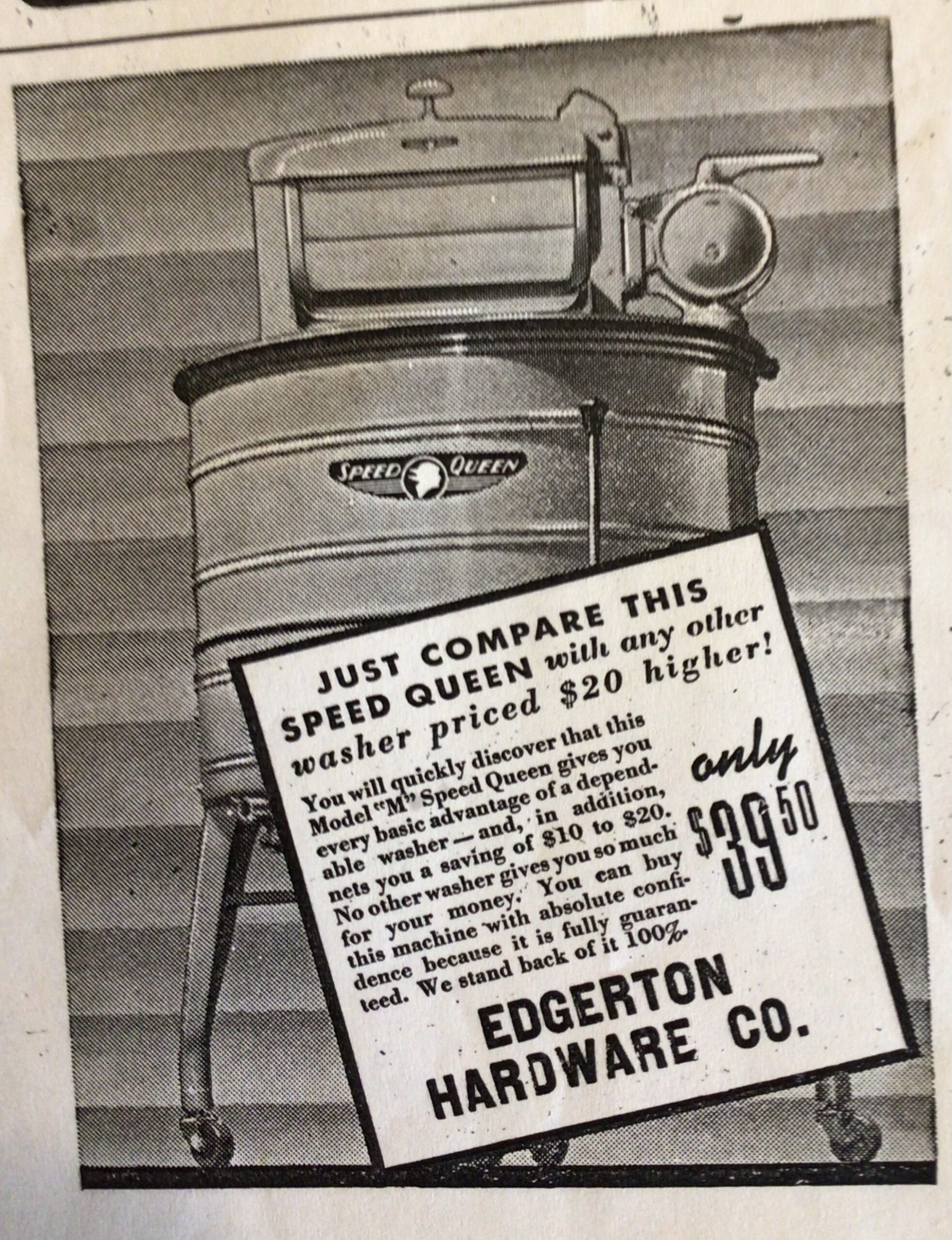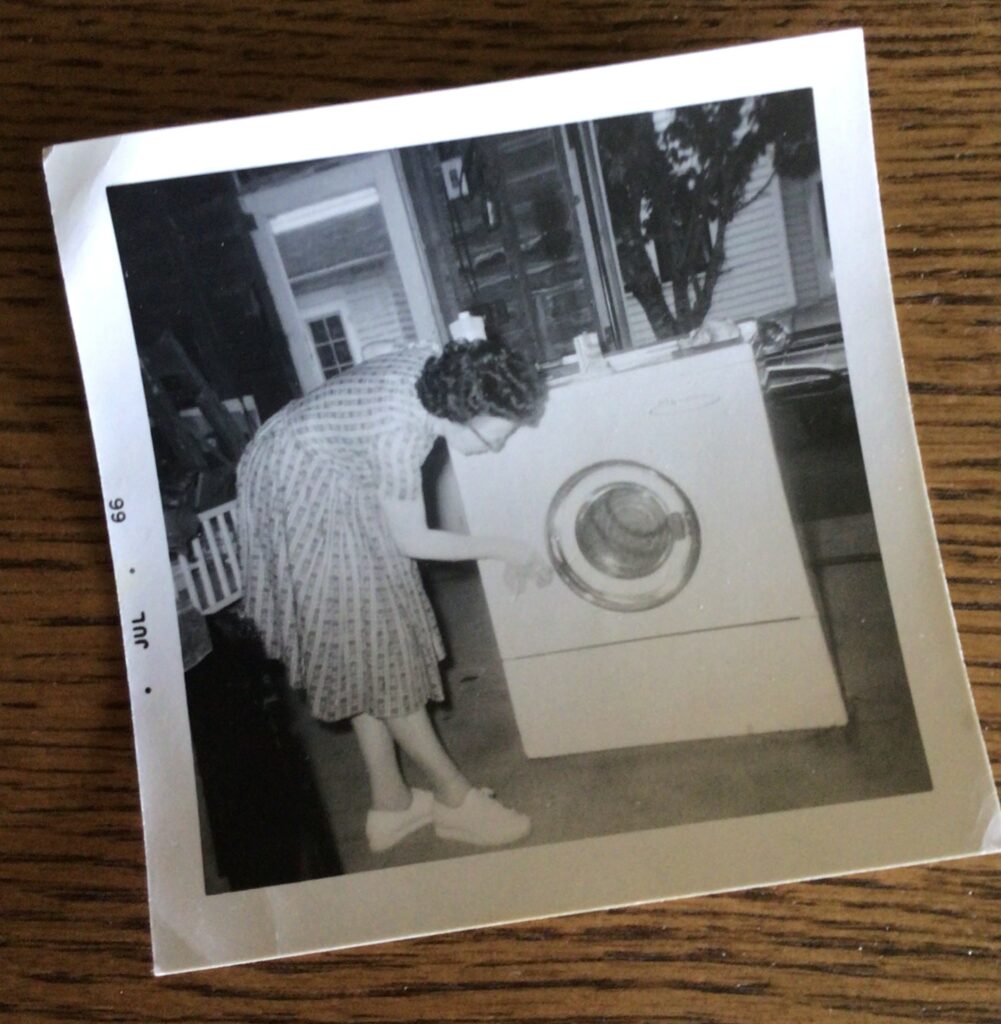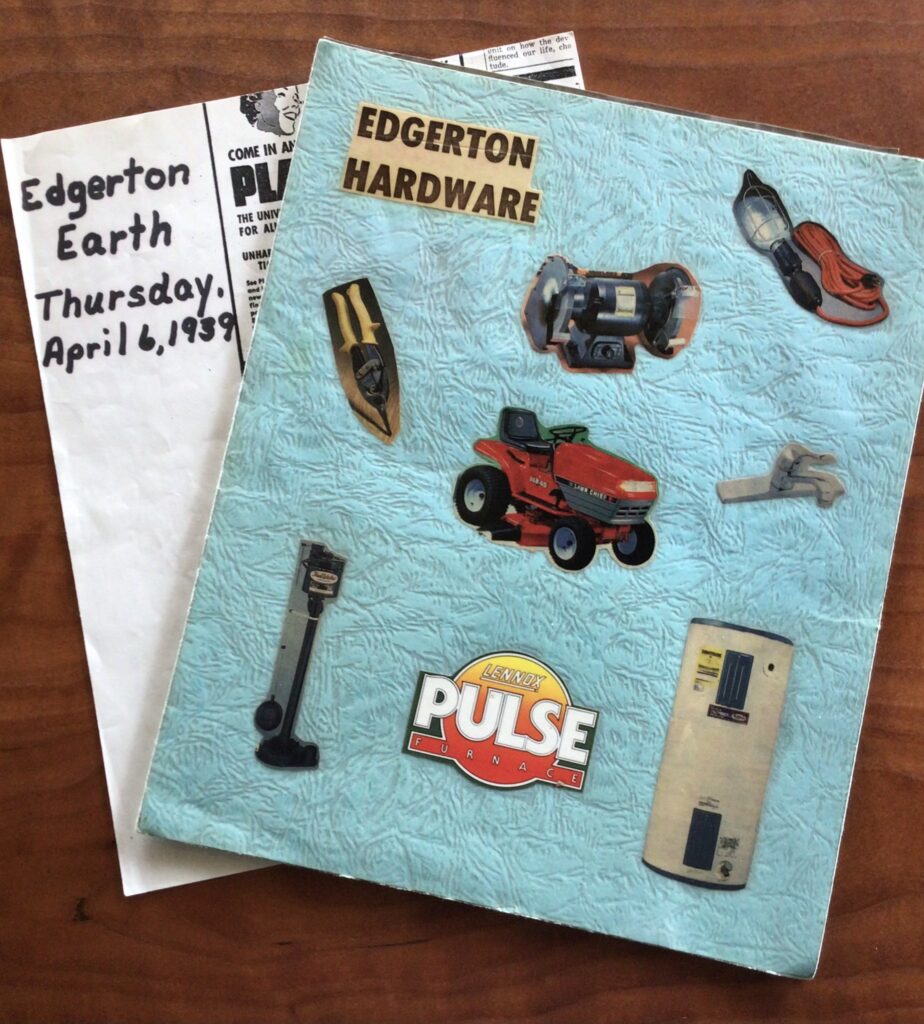
Taking Up Housekeeping
When you are a newlywed and go to the grocery store to shop for the first time for canned goods and such – should you save the receipt?
My mother saved her first grocery store receipt, and I know this because she wrote on the back “Mr. and Mrs. Vernon Kimpel’s first grocery bill.”
Mom and Dad were married in October of 1947 and lived with Grandma and Grandpa Imm until the following spring when the remodeling of their home was finished. The receipt was dated March 20, 1948, which was a Saturday, and they spent $12.10.
It may be safe to say she was excited about her up-and-coming role as a young housewife. If only we could keep that kind of enthusiasm throughout our housekeeping days.
What was she thinking when she penned their names on that receipt? Would the historian in her know that someday the receipt would be so old it would catch someone’s eye? Like her ninth child would write about it 73 years after the receipt popped out of the 1940s grocery store cash register?
If God would have asked her to guess how many children she was going to have – what number would she have thought reasonable?
My mother was also the saver of owners’ manuals, and I have to admit I have saved more than a few owners’ manuals. I’ve never needed to refer to the manual, but that has not stopped me from saving them.
I have found the younger generation doesn’t save the manuals for they know the information is now online. One thing they will never know is what it is like to own a file cabinet full of such important little booklets. And cookbooks – who could have predicted cookbooks would someday be not-so-necessary?
Those who were raised a few decades ago may recall what a small town hardware store looked like with the line-up of already assembled bicycles for sale. I remember a light green sting-ray bicycle that the younger siblings used. I thought the bike belonged to Jeanette, but Lee remembers selecting it from the lineup of bicycles at the hardware where Dad worked.
Within the hardware store was a narrow staircase which led to the toys and row of bicycles. If only I had a few pictures of the items upstairs in that hardware. Day’s Carpet is now located in the building once occupied by the hardware.
Lee’s birthday is in July, so my guess is he rode his new bicycle home.
None of us seem to know where that little light green string ray bike went after the Kimpel children and grandchildren were finished with it, but the mystery of the owner’s manual has been solved. Lee will soon know the feeling of finding a 1970s Huffy owner’s manual in his box of inherited papers his mother saved for him.
I understand the thrill of a new appliance being delivered to the home, so when I found a photo of my mother cleaning the front of a new washing machine, I know Dad brought out his camera because it was a big day for a large family.
The photo gives an idea of how a housewife dressed in the 1950s. Mom can be seen in her work dress and shoes and cleaning cloth in her hand. How many life-time hours did my mother spend doing laundry?
Within my parents’ estate I found a work shirt my dad wore when he worked at the Busy Corner grocery store in the 1930s.
Not many people can say they have hand-washed a near ninety year old shirt with their father’s name embroidered on the pocket. I may have set some kind of record. I brought it back to life with a restoration cleaning detergent that my friend Kathy was familiar with through her quilting hobby.
I wonder if this is the one-and-only Busy Corner shirt still in existence and perhaps needs to be displayed in a museum so everyone can marvel at it. The embroidery on the back is fairly impressive and made me wonder where they ordered their work shirts back then.
My dad and his brothers were just young boys when they started working on Frank and Cora Hootmans’ farm in exchange for room and board and meals. The Hootmans owned the Busy Corner grocery store and gas station, and Dad started working for them at the store during his junior year of high school.
As the name of the store implies, it was a busy store that was located on a busy corner on State Route 6 near the railroad tracks and across from the feed mill. Ken’s Car Wash now sits where the general store once was. Those who remember the property describe it with wonderful old-time charm.
In April of 1939, when Dad was 19 years old, Carmen Siebenaler and Corres Weber asked him to work for them at the Edgerton Hardware, so Dad started his employment as a hardware clerk and moved on to be the guy who did the service work.
In my dad’s hand-written memoir, he tells us that twenty-one year old men were the first to be drafted in WWII, and he fell right into that age category. He received a letter instructing him to be at the Bryan American Legion Hall on March 18 of 1941. He would be taken by bus to Toledo for a complete physical and induction into the Army. I have a copy of the letter addressed to him, and the letter went on to state failure to show up was an act punishable by imprisonment and fine.
It was supposed to be a one year stint, but Dad was discharged from the service nearly five years later and resumed his job at the hardware in December of 1945.
Several of us wondered where Dad and his brother Russ resided after their return home from the service and before they were married. Since my mom was into details, wouldn’t you know she included a notation in one of her stories that Dad and Russ chose to live with their older half-brother Paul Miller and his wife Edna.
Since the Millers lived beside the school, Dad and Uncle Russ would have been able to walk to the downtown area. Mom’s notes tell us Dad’s first car was a Plymouth which he had purchased before he was in the service.
She also wrote that the 1930s was a time when people began installing coal furnaces and indoor plumbing, and Dad learned how to do this kind of work from Paul Krill, Vic Hopkins, and Don Siebenaler.
So when 1989 rolled around, and Dad was 70 years old, he decided to retire. He had logged 50 years of servicing furnaces as well as work in plumbing, heating, and wiring. I remember when we gathered in the banquet room at Bob’s Dairy Bar for a surprise retirement party for him. The photos from that evening captured a lot of smiles, and Dad was truly surprised.
I recently found a laminated folder in my parents’ home, and it took a few moments of study to figure out the folder was a retirement gift to my dad. My nephew Josh was 12 years old when he made, and appropriately signed, the gift he put together for his grandfather.
Dad probably thought he had received one of the best retirement gifts possible: a personalized gift from his grandson. Josh put his new found love for creating things with contact paper to good use by finding pictures of items that represented his grandfather’s life and times.
Josh included a laminated copy of a 1939 Edgerton Hardware newspaper advertisement for a Speed Queen Model M ringer washer – yours for $39.50, which would be $389.00 in today’s money.
The Edgerton Hardware advertisement reads: Just compare this Speed Queen with any other washer priced $20 and higher! You will quickly discover that this Model “M” Speed Queen gives you every basic advantage of a dependable washer – and, in addition, nets you a saving of $10 to $20. No other washer gives you so much for your money. You can buy this machine with absolute confidence because it is fully guaranteed. We stand back of it 100%.
Things were built so well back then it makes me think there are probably a few of those washers still working today. I remember Dad put a ringer washer in our basement when I was a child. I think it was a bit of a novelty item to him, but I remember he enjoyed washing a few of his work clothes and showing us how to use a ringer washer.
One thing my dad was not is a procrastinator. In my growing up years, I remember Dad watched a couple of shows on television – HeeHaw on Saturday nights and Cincinnati Reds games when he could. It seems his generation was ‘free’ and not bound by electronics but rather spent time outdoors or in his garage or garden.
My sister Jeanette and I watched Gilligan’s Island and Brady Bunch after school. In the evenings, we watched Happy Days on Tuesday evening, The Waltons on Wednesday, and Little House on the Prairie on Thursday night. Thankfully we spent Sundays with cousins or friends, and television wasn’t important.
After we were married, our homes became the place my parents visited. I remember a summer afternoon when my daughters were toddlers, and my mom and dad were sitting on our front porch with us. My dad noticed a broken wheel on our double baby stroller. I have never forgotten how very much Dad needed to take that stroller home, for he had saved a wheel he knew would fit. There was no stopping him; he loaded the stroller in his car and soon returned it in working order.
Oh the perks of having family members who know how to repair things and approach their work with great enthusiasm.
As a child, I heard someone say “You can’t take it with you, but you can send it ahead,” and I did not know what that meant.
The first part is fairly easy as well as comical – “You can’t take it with you.” There is no need to put any thought into it. You simply cannot take it with you.
I did not understand the second part “You can send it ahead.” What can you send ahead and please tell me how. I don’t think this is an area we should procrastinate on. I think I want to get it done and send it ahead. Whatever it is.
When I write about my parents, their friends, and those in the community in which we grew up, I realize God has provided us with many ways to store up treasures in heaven, and we’ve been doing so all the days of our lives.
Little things like speaking words of kindness, thinking good thoughts of others, reading the original owner’s manual, teaching others how to be a repairman, fixing meals and doing laundry, loving the life we were given, praying for others as well as ourselves, raising the children God decided were ours to raise, making a home-made gift for someone you love, and fixing a wheel on another’s mode of transportation are just a few ways to stash some treasures away.
When I look at the signed receipt my mother left behind, it’s safe to say she had no intentions of ever throwing that receipt away. It was just one of her little pieces of paper she left for the next generation to find.
Perhaps my parents’ grocery store receipt is really a message to us – a reminder that we can choose to do little things with great love.
So don’t give up on us, Mom and Dad, we’ve got a little more work to do, and we’ll see you soon. In the meantime, we’ll be loving you and loving the way you raised us in the house you made into a home that was busting at the seams with more children and grandchildren than you could have ever imagined.



Leave a Reply
You must be logged in to post a comment.